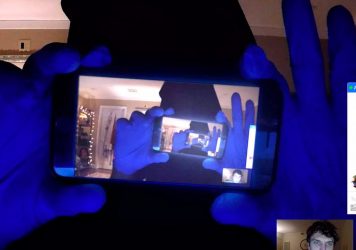Carlota Pereda explores naturalism and gore in this Spanish contemporary horror about a bullied teenager turning the tables.
It’s summer in Extremadura, Spain, and Sara (Laura Galán) is a teenager being bullied by other girls for being fat and unpopular. However, these cruel jokes end when a stranger appears and kidnaps the bullies – Sara is suddenly forced to choose between saving the girls that tormented her, or staying quiet and protecting the man who has helped her.
Writer-director Carlota Pereda has embarked on a risky debut with this horror film that addresses bullying, fatphobia and the social stigma associated with obesity while delivering on gore and shocks. The film’s journey started with a 13-minute long Goya award-winning short, set in the day, similar to Who Can Kill a Child. Horror movies that avoid darkness as an element of terror can often be scarier since the terror will be based more on the plot and less on the atmosphere.
Pereda delves into that horror in a creative way, gives us a unique proposal within a bizarre story and transforms a social issue into a tale of gore. While American and British horror has often used the genre as a means to analyze social issues, this feels quite new in Spanish horror, and the film has a contemporary relevance since Sara’s tormentors love posting pictures online to humiliate her and her family, illustrating the role social media has found in bullying.
The psychopath, his lair, the bloody gore, and Piggy’s rural setting take us back to 1974, to Tobe Hooper’s The Texas Chain Saw Massacre, while Sara’s social outcast seeking revenge against those who have humiliated her is reminiscent Brian de Palma’s Carrie, even making a visual reference to Carrie’s prom scene in its poster.
The lack of anonymity in this small, suburban and rural setting plus the oppressive summer heat that surrounds these areas of Extremadura transmit claustrophobia. The customs and the accurate interpretation of how people live in small Spanish towns are seen in the town festivals, Sara’s parents’ butcher’s shop and gossiping neighbours, and Pereda’s naturalism captures the typical expressions and mannerisms of people from little towns. The funny relationship Sara has with her mother (Spanish comedy actress Carmen Machi) also brings a bit of lightness to a very dark topic.
This is not a moralistic story, and Pereda pitches it right by allowing the audience to feel close to Sara: a young woman who has been through a lot, but is allowed to harbour her desires of vengeance. When she decides to get to know the psychopath who kidnapped her enemies, she becomes a clear anti-heroine – but Piggy invites us to reflect on the casual cruelty of bullying from the distance that the horror genre offers, and consider the price of revenge.
Published 5 Jan 2023
What happened to Sara after that disturbing last scene in the 2018 short?
A social issue, a gory film, an anti-heroine from a small Spanish town – all in one.
The slasher style, small-town naturalism and nods to 70s horror are quite memorable.

By Anton Bitel
Adolescence is key to everything in this seminal Stephen King adaptation from 1974.

It’s a classic tale of boy eats girl in Mimi Cave’s directorial debut, but the flavour profile is off.

A group of friends become embroiled in a sadistic internet game in the latest found footage phenomenon.